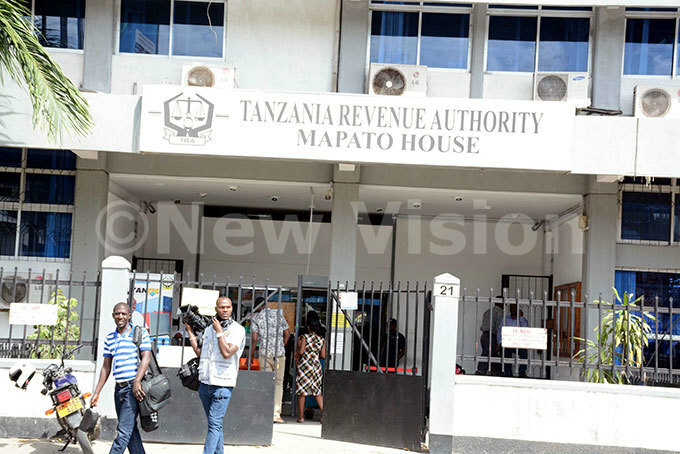Let us avoid nursery wars to boost trade: TZ customs official
''I think we should not behave like Trump and China. We should avoid such nursery wars and utilise the available channels to address our issues”
Let us avoid engaging in nursery wars and address issues as they come in order to boost trade in the East African Community (EAC), said Usaje B. Asubisye, the commissioner for customs and excise, Tanzania Revenue Authority (TRA).
Usanje said in the spirit of EAC, Tanzania had appointed a team of experts to travel to Uganda to verify the country's edible oil to ascertain whether it meets the national standards and qualifies for export in their market.
He said the TZA had received a letter from Uganda in the process of getting its edible oil cleared for export to the Tanzanian market.
Usaje was Tuesday addressing a team of journalists from the six member states of the EAC on a media tour to publicise achievements in the pharmaceutical sector, Mutual Recognition Agreements (MRA) and Single Customs Territory (SCT).
The tour is facilitated by EAC secretariat and the Germany International Corporation (GiZ) in collaboration with the East African Business Council (EABC).

The headquarters of the Tanzania Revenue Authority (TRA) in Dar es Salaam. Photo by Eddie Ssejjoba
Responding to concerns that Tanzanian authorities had not cleared edible oil imports on grounds that it does not meet the ‘certificate of origin' criteria, Usaje said he was not aware about the scenario and stated that he had not been notified about any cases of rejection.
He however said that there were a number of setbacks towards EAC achieving a fully-fledged customs union.
According to Usaje, although Tanzania had not yet adopted the Electronic Cargo Tracking System (eCTs) there were concerns that Kenya had refused to send its customs officials to Dar es Salaam port under the SCT.
He said Tanzania had sent a team to have base at Mombasa Port it was only Kenya in the EAC region that was still dragging its feet to reciprocate.
He said even countries like DR Congo, which is not an EAC member state had stationed its customs officials at Dar es Salaam.
"Our commission is not happy that up to now Kenya has refused to send their human resource to Dar es Salaam; this is not the spirit of EAC that we are working for".
"We believe if Kenya Revenue Authority (KRA) sends its people, importers from their country will start using our port," he stated.
Wolfgang E. Salia, the TRA's manager for suspense procedures stated that in the spirit of EAC, there was an urgent need to harmonise the trading systems as agreed on through the various treaties to avoid mistrust and inconveniences to traders.
He said whereas Kenya, Uganda and Rwanda along the Northern Corridor were using one eCTS, which covers the Mombasa-Kampala-Kigali route, Tanzania was still using its old system, the Tanzania Customs Integrated System (TANCIS).
The TANCIS replaced the Automated Systems for Customs Data Management (ASYCUDA) which is still being used by Burundi.
Salia said the Northern Corridor had demanded that Tanzania abandons their system and adopt their model, which they rejected saying experts from the two sides needed to first discuss and come out with a harmonised one, so that out of the two, they can obtain regional models that put into consideration the needs and demands of all the sister countries.
He was supported by Usaje, who argued that experts from EAC secretariat needed to iron out differences including the fact that Tanzania allows vendors (traders) to buy their own tracking devices, which operate up to its borders.
According to the Tanzanian model, when a trader crosses the border into another country, the device is removed and he has to apply to the revenue authorities of those countries to mount other tracking devices, which had raised concern from traders who complained against added costs with multiple devices.
The Kenya Revenue Authority (KRA) charges $1,000 for one device, yet the trader using
Dar es Salaam port would have used a single device for all the six countries.
"We know multiple tracking systems are time wasting and pose added costs to the transporter but we need to harmonise the two models," Usaje stated. The eCTS was launched in Kigali in 2017 by member states.
According to the commissioner, the eCTS works together with the Single Customs Territory (SCT), which he said eliminates dumping of goods without paying taxes.
"Many traders would evade taxes through claims that they were transporting the cargo to another country and end up diverting and dumping them in Tanzania but now taxes are paid upfront to a destination country when they are still at the port," he said.
He said this had also simplified procedures of delivering goods to landlocked countries.
"But the scheme works well where government functions are active. The SCT will therefore thrive where there is political will and active governments," he stated.
Usanje also wants EAC states to iron out issues in their different monitory systems, which he said operate differently according to economic situations.
"TRA is trying to advise government on various tax policies for appropriate tax tariffs because high tax rates do not guarantee collection of more revenue," he said, adding that tariff on sugar imported into their country stood at 18% whereas they taxed 25% for imports from outside the region.
He said the tariff is intended to protect local industry, but also mentioned of some textile products from Tanzania, which he said had been barred in Kenya on pretext that they did not meet their standards.
''I think we should not behave like Trump and China. We should avoid such nursery wars and utilise the available channels to address our issues," Asubisye, stated.
The EAC secretariat regards the SCT as the last step towards achieving full attainment of the Customs Union for the region and wants member states to harmonise and deal with hitches that are still hindering its achievement.